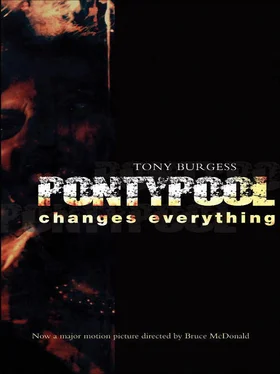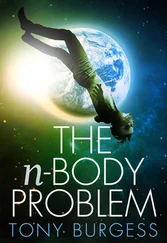In this place, a bony little peninsula slicing into shallow silver water, Ellen is stepping forward, her bare toes gripping rock and displacing little black egg cups of water. When she reaches the crooked tip she returns to her crouch. She looks offinto the air above the water, into the streaks of a soft illumination around her, a hanging moss, impenetrable and glowing. This is an isolated place. Her heart sinks. People don’t come here. She drops her chin onto her knee and glides the backs of her knuckles, as if stroking a cat, in a little velvet inlet by her foot.
How often is a baby supposed to cry? There are probably answers. You can picture them. A doctor is saying every crying baby is in distress. Another says every crying baby is an exploring person. Ten times a day. The baby cried constantly. The baby cried in the morning but only for an hour. An hour? Doctor? An hour? The baby never cries. Never? No, never. OK, we’ll have to run some tests. Never?
Always. Les pulls over in Green River. The baby has been bent in a rigid bow on the seat beside him, crying a continuous wail for a full half-hour. Les slides his hand under the space beneath the baby’s arched back. Too intense. He tilts the stiff body back to rest across his palm. The wailing rises sharply. He’s in pain.
Les carefully slips his hand away. He makes a reassuring face to the infant. He touches its toes and its face inflames. Why, little boy? A man nearby pulls himself out from under an open hood. He looks over at Les. Les panics for a second. He cups both his hands, scaring himself. They are made for stifling babies. He feels a rush of compassion for the baby, but his compassionate hands can only press into the seat surrounding it, and failing thus he lifts them to his chest and grabs handfuls of himself, compassionately. I don’t know your name.
Its fingers are as blue as a baby sparrow’s head, and its entire body is locked in scream. Les looks out the window to make sure nobody else is nearby. The man repairing his car has gone. Repaired. The screams have caused the forest to close itself off and tuck its edges into a finer line under the sky. The painful tone sustains a frequency of such duration that it becomes soundless, and Les feels the blood leave his face. The silence packs his ears. He is afraid because he knows that the soundless car, leaning like a spike among the tick of gas pumps, is prompting him to know something — to know exactly, now, why his son is in such pain.
Withdrawal.
An opiate withdrawals crack jones intolerance of time.
I may have to kill my son.
Les hovers his hands over the baby, now little more than a knot of his own agony, and drops three fingers lightly on its face. Such a small commitment to infanticide. He curls the fingers up into his palm and withdraws the fist. Loving his son has suddenly become impossible. Les steps out of the car, and when he slams the door he again hears the little creature’s pain. He feels a terrible flood of guilt and grief. These feelings are kept from spilling by a tiny mopping sponge of self-pity.
His encroaching insanity has already converted this shadowy experience, which sits near his centre, into a delicate model. A mobile of silver half moons and flat gold slippers redistributes Les around the car. He feels the threads of suspension and the little wind that means so much now. Something is still here. Something can be done. If I Jail, I will destroy that baby and kill myself. Strong alternatives are needed. My son and I are crossing the line from sound to unsound body.
Across the highway is a mall. A drugstore. Les feels a strange smirk twist his face, and for the first time he loves his son, the little drug addict son of a bitch. He was born knowing what I know. When he reenters the car he opens the surface of his body onto the searing noise, feeling it drill deeply, and he smiles at his son through this atmosphere of pain.
Having never robbed a store before, Les has a nagging feeling, as he fingers the antihistamines, that the handgun tucked against his back just isn’t enough. He looks up at a camera swaying like a metal remora in the corner, and he brings his hand up to his face. Mask. He goes down the school-supplies aisle and, sure enough, finds a plastic mask tucked behind stack of lab books. It’s a cheap one. A thin elastic is hastily attached to the sides with staples. Small. He turns it over. A smiling blonde witch. A good witch. Les puts it on and reaches behind for the gun as he makes his way to the pharmacist. He waves the gun at a shape he can little more than locate through the slit windows of the dark interior of the mask. He sees a young man, a sideburn. Hand comes up. Stops. Goes down again.
“OK. Don’t shoot. Anything you want.”
Suddenly the elastic snaps and Les feels a wasp sting his ear. The mask jumps from his face directly into the open, pleading hands of the pharmacist. Les pulls the trigger of the gun and it clicks. It just clicks. No bullets. Les instinctively coughs to cover up the tiny noise, to camouflage it quickly. The pharmacist is looking down with horror at the mask in his hands. He feels the sheer panic of torn impulses and misses the click. He drops the mask on the counter.
“I won’t look. I didn’t see you. Please don’t shoot.”
Realizing he’s still in the game, Les sweeps the mask up, inadvertently dragging its code across a smudged window, setting off the piercing beep. A fuckin’ alarm. Les levels the gun at the pharmacist and fires. Click. This second click is covered up by the louder clang of the cash register opening as the pharmacist tries to illustrate the source of the beep. Les thinks, I’m doing a lot of killing. He waves the gun and instructs the pharmacist: “Dilaudid. All of your Dilaudid.”
The pharmacist races down an aisle and returns with a large plastic jar and drops it in front of Les. As he turns to leave, an elderly couple who have been watching everything take a step backward. He raises the gun and clicks it three times. Kill everybody. The couple don’t even flinch. Les barks at them and they run. Kill everybody.
20
How Many Times Have I Told You?
As they pull out of Green River, father and son are dissolving the blue halves of a Dilaudid under their tongues. As they sail through Greenwood, some minutes later, Dad thinks to himself: Well really, if the baby gets half, maybe I should take one and a half. He twirls off the lid and pops another into his mouth. Beside him his son is quiet. This is what it takes. Les flops a hand across the comfort of the steering wheel. I’m stoned. He feels the tiny fractures in his elbow melt over and strengthen. I have been conscripted into an army. Les smiles to himself. That kid at the pharmacy knows a little more now. The world has revealed the gun it points at him. Along the stretch of road between Brooklyn and Manchester, Les has his first fantasy about life with his son. A son he names Ernie.
21
It’s a Wonderful Life with Ernie
The church in Pontypool is one of those rural teeth that have turned slightly toward the back of the throat, missed by the toothbrush. It appears as a space, sometimes dark with dirt, sometimes cast in shadow. A round black-orange structure that sits off the back, under the trees, hides a tiny cemetery from the road. Two black Labradors are running between white-skinned headstones. One dog moves with a dip and find gait, and the other follows, not trusting its own navigation because of the chopstick deformity in its jaw which causes its lower teeth to slap eastward when it goes south. The dogs stop in the woods just beyond the back row of headstones and they circle a contraption made of metal tubing and the flesh of old tires. The lead dog takes a hunk of this rubber in its mouth and growl whines at the other while it blinks its intelligent eye from side to side. The contraption is a large cartoon of a bear trap made out of a bike rack. Around the playing dogs are trees cut to their stumps.
Читать дальше












